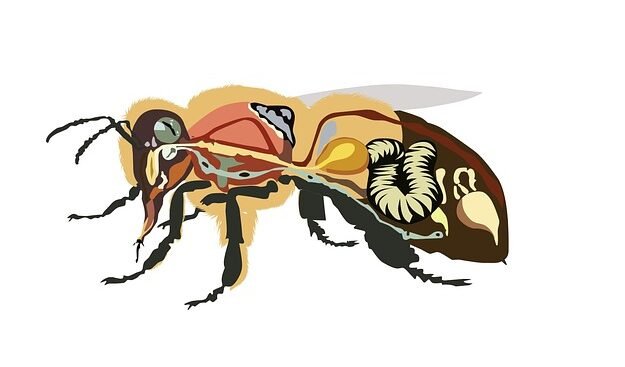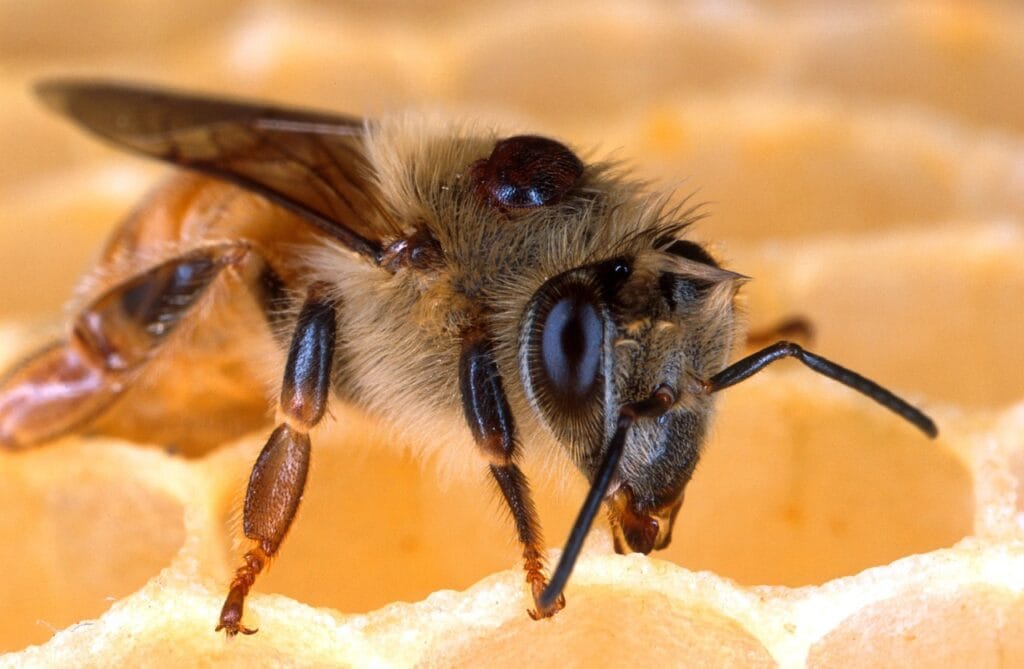Image by Raden Dedi Ashar Suryana from Pixabay
Does Using Bee Probiotics & Super Food Help to Improve Bee Gut Health?
The application of probiotics in beekeeping represents an emerging field that offers promising alternatives to traditional antibiotic treatments for maintaining honey bee colony health.
As managed honey bee populations face escalating challenges from diseases, parasites, and environmental stressors, beekeepers are increasingly turning to beneficial microorganisms as a sustainable approach to support hive vitality.[1][2]
Understanding Bee Gut Microbiomes and Probiotic Potential
Honey bees possess a highly specialized gut microbiota that plays crucial roles in digestion, immune function, and pathogen protection.
The core gut community is dominated by specific bacterial taxa including Snodgrassella alvi, Gilliamella apicola, Lactobacillus species, Bifidobacterium, and Bartonella. This microbiome is essential for bee health, influencing nutrient processing, detoxification, immune responses, and resistance to disease.[3][4][5][6][1]
Research demonstrates that probiotics can enhance bee health through multiple mechanisms, including boosting immune responses, supporting the endogenous microbiome, and producing antimicrobial compounds.
Lactic acid bacteria (LAB), particularly fructophilic lactic acid bacteria (FLAB) that thrive in fructose-rich environments like nectar, represent the most extensively studied probiotic candidates for honey bees.[5][7][1]
Native vs. Non-Native Probiotic Approaches
A critical distinction exists between probiotics containing native bee gut bacteria versus non-native strains commonly used in commercial products.
Native gut bacteria demonstrate superior colonization ability and persistence in bee digestive systems. Experimental work shows that cultured strains of native bee gut bacteria colonize robustly while bacteria in commercial probiotics fail to establish in bee guts.[2][6]
Studies reveal that defined communities of native gut bacteria successfully mimic natural gut communities in their effects on host gene expression, including activation of key immunity and metabolism genes.
In contrast, most commercial probiotics contain bacterial species isolated from mammals or environmental sources that have never been found naturally in honeybees.[6][8][2]
Delivery Methods and Applications
Two primary delivery systems have emerged for probiotic administration to bee colonies:
Pollen Patty Method
The traditional approach involves incorporating probiotics into pollen substitute patties placed on top of brood chambers.
This method provides nutritional benefits alongside probiotic supplementation and has shown effectiveness in promoting brood development and enriching health-associated microbes in adult bees.[9][10]
Spray-Based Application
A novel spray-based delivery system enables direct application of probiotic suspensions to brood frames.
Research demonstrates that spray application shows unique effectiveness against larval pathogens like Ascosphaera apis and facilitates better distribution throughout the hive. Both delivery methods result in detectable increases of probiotic strains in honey bee hindguts, though long-term colonization remains limited.[10][11][9]
Disease Control Applications
Probiotics show particular promise for managing several major honey bee diseases:
American and European Foulbrood
Laboratory studies indicate that certain probiotic strains can inhibit Paenibacillus larvae (AFB) and Melissococcus plutonius (EFB) through competitive exclusion and antimicrobial compound production.
Field trials have demonstrated reduced pathogen loads in colonies supplemented with specific lactobacilli consortiums.[12][1][2][9][10]
Nosemosis
Multiple studies report that probiotic treatments can suppress Nosema spore development and maintain beneficial gut bacteria populations.
The probiotic EM® for bees showed effectiveness in reducing Nosema infection levels while increasing proportions of beneficial Gilliamella and Snodgrassella species.[13][14]
Immune System Enhancement
Probiotics stimulate honey bee innate immune responses through activation of antimicrobial peptide (AMP) production.
Research shows that beneficial bacteria trigger upregulation of immune pathway genes including abaecin, apidaecin, defensin, and hymenoptaecin.[15][16][12]
Commercial Products and Market Reality
Several commercial probiotic products are marketed specifically for beekeepers, including SuperDFM-HoneyBee™ and Pro DFM from Mann Lake. However, scientific evaluation reveals significant limitations in current commercial offerings:[8][17][18]
- Most products contain non-native bacterial strains that fail to colonize bee guts[17][19]
- Limited peer-reviewed research supports manufacturer claims[20][8]
- Field studies often show no significant differences between probiotic-treated and control colonies[18][19][17]
A comprehensive field study of SuperDFM-HoneyBee™ found that microorganisms in the probiotic supplement were never detected in worker bee gut samples, even during active treatment periods.[19][17]
Regulatory Landscape and Safety Considerations
Bee probiotics currently operate in a regulatory gap, with no FDA or USDA oversight requiring efficacy validation.
Products are classified as supplements rather than medicines, meaning beekeepers must rely primarily on manufacturer claims without independent scientific verification.[21][22]
Despite regulatory limitations, probiotics are generally considered safe for use in beehives, with no adverse effects reported from recommended applications.
Safety studies indicate that probiotic supplementation is well-tolerated and can improve overall bee wellbeing indicators.[22][23]
Future Research Directions and Recommendations
The field of bee probiotics stands at a critical juncture requiring substantial research investment to realize its potential.
Native gut bacteria-based probiotics represent the most promising avenue for development, though significant work remains to transition from laboratory successes to practical field applications.[6][24]
Key research priorities include:
- Large-scale field validation of native probiotic consortiums
- Optimization of delivery methods and dosing protocols
- Investigation of probiotic effects on queen health and productivity
- Development of standardized efficacy testing procedures
- Economic analysis of probiotic interventions versus traditional treatments
In Summary
For beekeepers considering probiotic supplementation, current evidence suggests exercising caution with commercial products while staying informed about emerging native probiotic research.
The integration of probiotics with other sustainable beekeeping practices may ultimately provide the most effective approach to supporting colony health in an era of increasing environmental challenges.[8][20]
While probiotics offer genuine promise for enhancing honey bee health through natural mechanisms, the field requires continued scientific rigor to distinguish effective interventions from marketing claims.
As research progresses toward evidence-based probiotic solutions, beekeepers and researchers alike must maintain realistic expectations while supporting the development of truly beneficial microbial therapies for our essential pollinators.
⁂
- https://pmc.ncbi.nlm.nih.gov/articles/PMC10699873/
- https://www.nature.com/articles/s41598-024-77338-1
- https://news.westernu.ca/2023/06/probiotics-honeybee-health/
- https://www.benedictsgarden.com/catalog/product/842/honeybee-probiotic
- https://pmc.ncbi.nlm.nih.gov/articles/PMC11204305/
- https://pmc.ncbi.nlm.nih.gov/articles/PMC9058534/
- https://researchmagazine.uncg.edu/spring-2023/part-of-the-hive/the-buzz-about-bee-probiotics/
- https://pmc.ncbi.nlm.nih.gov/articles/PMC10998682/
- https://www.nature.com/articles/s41396-023-01422-z
- https://www.strongmicrobials.com
- https://journals.asm.org/doi/10.1128/spectrum.00578-24
- https://pmc.ncbi.nlm.nih.gov/articles/PMC8953987/
- https://academic.oup.com/jinsectscience/article/23/6/17/7458956
- https://www.frontiersin.org/journals/sustainable-food-systems/articles/10.3389/fsufs.2023.1113920/full
- https://royalsocietypublishing.org/doi/10.1098/rstb.2021.0156
- https://pubmed.ncbi.nlm.nih.gov/35323606/
- https://beeculture.com/probiotics-pro-for-biotic-life/
- https://journals.plos.org/plosone/article?id=10.1371%2Fjournal.pone.0033188
- https://scientificbeekeeping.com/probiotics-and-colony-productivity/
- https://pmc.ncbi.nlm.nih.gov/articles/PMC10432525/
- https://pubmed.ncbi.nlm.nih.gov/38112994/
- https://www.nature.com/articles/s41598-024-52118-z
- https://link.springer.com/article/10.1007/s12602-023-10203-1
- https://scientificbeekeeping.com/a-field-trial-of-probiotics/
Ad – Amazon Associate Store



